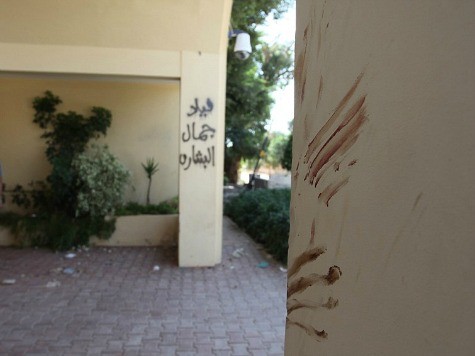The Hague’s International Center for Counter-Terrorism (ICCT) recently released a report that shatters leftist talking points on the political situation in North Africa.
The report, titled “Security in the Sinai: Present and Future,” details not only the Sinai peninsula’s decent into chaos over the last two years, but synthesizes available research on the entire Islamist/Jihadi nexus that crosses North Africa, linking the Benghazi attack, Salafist activism undertaken by the Muslim Brotherhood, and links to what the administration’s intellectual vassals refer to as “al-Qaeda core.”
Sinai has long been a problem region for the Egyptian government, with bedouin tribes often taking advantage of a lack of governance in the peninsula during Egypt’s periods of political and economic upheaval. The most recent period of unrest is no different, with bedouin bandits engaging in criminal activity as soon as Mubarak’s political future was called into question by massive protests.
This banditry was rapidly replaced by Islamist militias connected to the Muslim Brotherhood and Hamas, who targeted Coptic churches as well as Egyptian state assets, including police outposts along the trans-Sinai oil pipeline. These attacks were against the Egyptian state and economy; they were not mere acts of profit-seeking criminality. Ansar Beit al-Maqdis (ABM), the most prominent jihadist group in Egypt, went so far as to use suicide bombings against Korean tourists, explicitly stating that they intended to ruin Egypt’s economy by targeting its heavy reliance on tourism.
This jihadist insurgency is supported by a larger political infrastructure, organized under the moniker of Salafiya Jihadiya (SJ). SJ was responsible for the extremely well organized “spontaneous” protests over an obscure video that targeted U.S. Embassies and installations across the Muslim world and is led by none other than Ayman al-Zawahiri’s younger brother, Muhammad al-Zawahiri.
Muhammad Jamal Abd al Rahim Ahmad al Kashif (frequently referred to as just Muhammad Jamal) is a veteran jihadist closely affiliated with Zawahiri. Jamal was mistakenly released in 2011, and in the two years before his arrest in 2013 he was responsible for establishing jihadist training camps in Sinai, Libya, and Western Egypt. Jamal is also known to have been closely involved in the September 11, 2012 attack on U.S. installations in Benghazi, Libya. Upon his arrest, Jamal was discovered to have been in direct contact with Ayman al-Zawahiri, requesting assistance and reporting that groundwork had been laid for an al Qaeda enterprise in Sinai. Jamal is also believed to have trained and directed Walid Badr, a former Egyptian military officer who served as a suicide bomber in an attempt on the life of the Egyptian Minister of Interior.
With Muhammad Jamal and Muhammad Zawahiri both connected to the attack against the US consulate in Benghazi (and with Zawahiri personally present at the riot outside of the US embassy in Cairo, where the American flag was torn down and replaced by the black banner of al-Qaeda), it would defy logic to remain content with the administration’s story. But the thread doesn’t end there.
In February, the Egyptian government released intercepted recordings of phone calls between then-president Muhammad Morsi and Muhammad Zawahiri. Zawahiri was formally acquitted of terrorism charges by Morsi in 2012 and was reported by CNN to be “helping” negotiations with jihadists in Sinai during Morsi’s tenure. Additional reporting, cited by the Jerusalem Post, acknowledges not only that Morsi and the younger Zawahiri were in contact, but that the Muslim Brotherhood’s original contender for the Egyptian presidency, Khariat el-Shater, was in contact with “al Qaeda core” elements in Pakistan and Palestine.
Muhammad Zawahiri’s quasi-political role in Salafiya Jihadiya, his intimate affiliation with the Muslim Brotherhood’s official leadership, his association with Muhammad Jamal’s jihadist infrastructure in Sinai, and his overt and direct participation in what the administration insists was a “spontaneous protest” in Cairo and Benghazi is a damning indictment of the Muslim Brotherhood’s direct connections to al-Qaeda.
Effectively, if Muhammad Zawahiri wanted to talk to his older brother he would have had to ask Morsi if he could use his phone. In the same instance, if the “core” of al Qaeda wanted to establish contact with Muhammad Jamal, its franchise in Northern Africa, including Benghazi, it would have likely relied on the same personalities. All of the above simply reinforce the stakes of the elections today and tomorrow in Cairo. General Sisi has openly stated his commitment to crush the Brotherhood beacause of its ties to al Qaeda. A victory for Sisi would be a victory against Salafi Jihadism.
The Hague is a European institution — it is not involved in American partisan politics and has no reason to bend the facts on Benghazi and the Brotherhood to fit a partisan agenda. These are the facts of the case, and those who continue to deny that Benghazi was a result of a “larger failure of foreign policy” are finally starting to feel the heat.
The Council for Global Security is a Washington-based non-profit organization that support democracy, prosperity and the protection of minorities around the world.

COMMENTS
Please let us know if you're having issues with commenting.